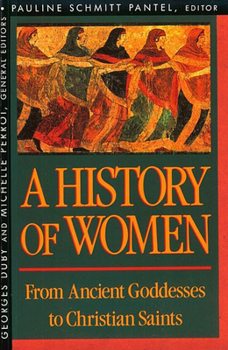History of Women in the West
(Book #1 in the A History of Women in the West Series)
Select Format
Select Condition 
Book Overview
Informed by the work of seventy-five distinguished historians, this five-volume series sets before us an engaging, panoramic chronicle that extends from antiquity to the present day.
Format:Paperback
Language:English
ISBN:067440369X
ISBN13:9780674403697
Release Date:April 2000
Publisher:Belknap Press
Length:600 Pages
Weight:1.70 lbs.
Dimensions:1.3" x 6.2" x 9.2"
Customer Reviews
1 rating
A historical vision of women, at last
Published by Thriftbooks.com User , 16 years ago
"Our ambition is grandiose," writes editor Pauline Schmitt Pantel. And why not? This book's editors and authors are building a historical record for better than half--or do I mean the better half?--of all humans descended from Greece and Rome. "A History of Women in the West, Volume 1" is full of the challenges our forebears had to debate. Take the first chapter: "What is a Goddess?" asks, "Is a goddess's femininity of the same kind found in mortal women or of a different, more intense kind?" (p.14). "Maternity was destiny," asserts another among many (mostly female) contributing authors, "as it was to all women prior to the advent of modern medicine" (p.298). "A History of Women in the West" gives a voice to females who came before, albeit an uneven voice. "We will have nothing to say about important periods of history," the editor warns, or about periods well covered elsewhere. So "A History of Women in the West" is not a general survey. Rather, this book explores the more prominent bumps on the sometimes barely discernable trace that measures the female pulse in history from classical times. "At one time a history of women would have seemed an inconceivable or futile undertaking," write general editors Georges Duby and Michelle Perrot. "The roles for which women were destined were silent ones: motherhood and homemaking." There were exceptions: "No tragedy was complete without a chorus of women in tears." (See Duby's "Women of the Twelfth Century" trilogy, Volume 1, Volume 2, Volume 3.) "A History of Women in the West" attempts and delivers a vast vision, from earth mothers to Engels. Midway between its covers--("Body Politics in Ancient Rome")--we learn that doctors advised wealthy families to bind the hips of newborn boys to produce a tight pelvis, but to leave girls' hips unbound--easing eventual childbirth and enhancing young women's allure. The means to achieving that end have changed through time, but the motive, never. General readers, take note! This book is eminently readable, but it is not easy. It succeeds as a volume of broad reach and high-minded scholarship without coming across as overly academic. First published in Italian, it benefits from an excellent English translation by Arthur Goldhammer, giving it a lighter, more fluent tone than one comes to expect from native English-speaking academics penning jargon in the passive voice. Goldhammer's even, readable style shines. So does "A History of Women in the West," which entertains and fascinates, suiting general readers who want to explore it in sections rather than read a long volume from cover to cover. Robert Fripp Author, "Power of a Woman. Memoirs of...Eleanor of Aquitaine"





